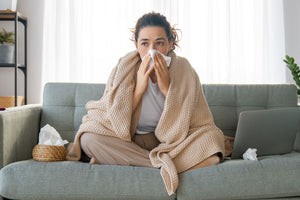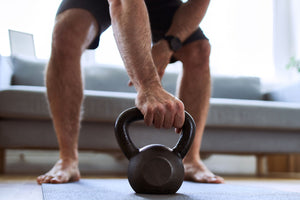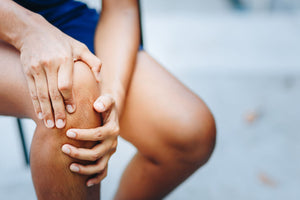Anxiety is the most common mental health issue among adults, affecting over 40 million adults in the United States.[1] Adults aren’t the only ones affected -- an estimated 31.9% of teens experience anxiety as well in the States.[1]
The good news is that anxiety is highly treatable. Unfortunately, only a small percentage get help.[1,2]
While you may not think of yourself as an anxious person, you’ve likely dealt with minor bouts of anxiety/stress, particularly at night. We’ve all had those days where we’re dead tired after a long day of working out, actual work, and whatever else life has thrown us. As tired as we feel, the second we turn off the lights, lie down, and snuggle under the covers our minds start racing, making sleep seem like an impossibility.
It’s not for lack of trying (or physically being tired) that’s preventing you from falling asleep…it’s a bout of anxiety.
As we mentioned above, reducing or calming your anxiety is possible.
Here are some expert-approved, research-backed tips and tricks to calm your anxiety and finally get some sleep!
#1 Exercise
Exercise is a natural, cost-effective, and research-backed option for reducing anxiety. In addition to reducing worries and stress, exercise also helps to burn calories, support cardiovascular health, and accelerate weight loss. While any kind of physical activity is better than being sedentary, a 2018 systematic review and meta-analysis concluded that higher intensity forms of exercise were more effective for reducing anxiety than lower intensity regimens.[2]
If you’re not sure where to start with your exercise program, we’ve eliminated the stress and guesswork with our FREE 1UP Fitness App. Within the app, you’ll gain access to customized training and nutrition plans to help you get the results you want no matter where you are on your fitness journey!
#2 Meditation
Meditation is an ancient practice that fosters a calm yet focused mind using techniques to maintain attention and awareness. Its origins date back at Hindu Vedas produced over 3500 years ago! While meditation has been practiced for centuries, and its benefits recognized by countless individuals, scientific studies were limited…until recently that is.
With increasing attention on mental health, researchers have started devoting more time and resources to investigating what meditation practitioners have known for thousands of years -- it works.
In addition to reducing anxiety, meditation has also been found to “rewire” the brain to improve cognitive function, mood, and behavior.[3] Additional studies indicate it can also promote healthier aging across the lifespan, particularly in regard to brain health.[4]
Some research has even shown that regular meditation (aka mindfulness-based training) is as effective for reducing anxiety as certain pharmaceuticals.[5]
If you’re not sure where to start with your meditation practice, check out any of the free guided meditations that’s readily available online.
#3 Breathing Exercises
We’ve all had those instances when we’re feeling stressed and overwhelmed and just need to take a minute to breathe. There’s a reason that breathing helps to calm your nerves and feel centered -- you direct your focus away from what’s causing stress and onto controlling your breathing. Researchers have found that altering your breathing “alters communication sent from the respiratory system, rapidly influencing brain regions regulating behavior, thought and emotion.”[6]
A recently published meta-analysis including 12 clinical trial involving a total of 785 men and women concluded that breathwork was effective for reducing stress and improving mental health.[7]
Plus, one of the best things about breathing exercises (as is the case with the previous two options) is that you don’t need any special equipment to perform it nor do you have to spend ridiculous amounts of money!
#4 Yoga
Yoga is a physical, mental, and (for many individuals) a spiritual practice that combines physical activity, breathing exercises, and meditation -- each of which helps reduce stress and anxiety, as we’ve already discussed.
It comes as no surprise then that yoga (which combines all three previously discussed elements) also helps to reduce stress and alleviate anxiety.[8] As is the case with exercise, breathing drills, and meditation there are many different styles/options when it comes to yoga. Some prefer a more calm, meditative practice while others enjoy a more active flow or power-style yoga.
If you’re not sure which is the right fit for you, take a class either in person or online and experiment to see which one you like best. Also, keep in mind that you have the flexibility to alternate which style of yoga (or breathing drill, exercise, meditation) any time you want. You’re not locked into some structured or regimented way of doing things. Do what’s best for YOU!
#5 Get Some Sun
Spending time outdoors is fundamental to human existence. Not only does sunshine (UV light) help our bodies to naturally synthesize vitamin D (an important precursor for building important hormones and supporting immune function), it also helps to reduce stress and improve feelings of well-being.
The reasons for this are many including being out in nature, increased levels of dopamine, and more. But, the simple truth of the matter is that we’re not meant to be cooped up inside all day (even those of us that consider ourselves introverts). Numerous studies have also found that low levels of sunlight exposure are linked to lower dopamine levels and poorer mood. On the flip side, spending time outdoors, even if it’s just for a short 10-minute walk, can do wonders to alleviate stress, improve creativity, and boost mood.[9,10]
#6 Avoid Technology Before Bed
Technology affords us countless conveniences and benefits each and every day. As versatile and great as it can be, though, it can also be a considerable source of stress, particularly social media. Scrolling on your feed right before bed, or even a few hours before bed, can drive up cortisol (stress) levels and anxiety, making it seemingly impossible to fall asleep.
A good rule of thumb is to avoid social media, news outlets, emails, and just about any other source of blue light-emitting technology at least two hours before bed. In addition to driving up stress levels, exposure to blue light from electronics also suppresses melatonin production, which further delays your ability to relax, unwind, and go to sleep.
#7 Consider Supplements
In addition to the above daily activities to reduce feelings of stress, you may also want to consider certain supplements that have been shown in research to help improve mood and reduce feelings of stress.
We’ve taken the best supplements for stress and included them in one convenient supplement -- 1UP Relax.
Relax can be taken anytime you’re feeling overwhelmed or want to chill out. It can be especially helpful for those that struggle with hyperactive minds before bed.
Takeaway
Anxiety affects millions of individuals around the world, and it’s one of the main reasons why so many people struggle to get quality sleep.
Try the suggestions outlined above and be on the road to a calmer state of mind, better mood, and greater recovery!
References
- https://adaa.org/understanding-anxiety/facts-statistics
- Aylett E, Small N, Bower P. Exercise in the treatment of clinical anxiety in general practice - a systematic review and meta-analysis. BMC Health Serv Res. 2018 Jul 16;18(1):559. doi: 10.1186/s12913-018-3313-5. PMID: 30012142; PMCID: PMC6048763.
- Basso JC, McHale A, Ende V, Oberlin DJ, Suzuki WA. Brief, daily meditation enhances attention, memory, mood, and emotional regulation in non-experienced meditators. Behav Brain Res. 2019 Jan 1;356:208-220. doi: 10.1016/j.bbr.2018.08.023. Epub 2018 Aug 25. PMID: 30153464.
- Marciniak R, Sheardova K, Cermáková P, Hudeček D, Sumec R, Hort J. Effect of meditation on cognitive functions in context of aging and neurodegenerative diseases. Front Behav Neurosci. 2014 Jan 27;8:17. doi: 10.3389/fnbeh.2014.00017. PMID: 24478663; PMCID: PMC3903052.
- Hoge EA, Bui E, Mete M, Dutton MA, Baker AW, Simon NM. Mindfulness-Based Stress Reduction vs Escitalopram for the Treatment of Adults With Anxiety Disorders: A Randomized Clinical Trial. JAMA Psychiatry. 2023 Jan 1;80(1):13-21. doi: 10.1001/jamapsychiatry.2022.3679. PMID: 36350591; PMCID: PMC9647561.
- Philippot, P., Chapelle, G. & Blairy, S. Respiratory feedback in the generation of emotion. Cogn. Emot. 16, 605–627.https://doi.org/10.1080/02699930143000392 (2002).
- Fincham, G.W., Strauss, C., Montero-Marin, J. et al. Effect of breathwork on stress and mental health: A meta-analysis of randomised-controlled trials. Sci Rep 13, 432 (2023). https://doi.org/10.1038/s41598-022-27247-y
- Shohani M, Badfar G, Nasirkandy MP, Kaikhavani S, Rahmati S, Modmeli Y, Soleymani A, Azami M. The Effect of Yoga on Stress, Anxiety, and Depression in Women. Int J Prev Med. 2018 Feb 21;9:21. doi: 10.4103/ijpvm.IJPVM_242_16. PMID: 29541436; PMCID: PMC5843960.
- Munir S, Abbas M. Seasonal Depressive Disorder. [Updated 2023 Mar 20]. In: StatPearls [Internet]. Treasure Island (FL): StatPearls Publishing; 2023 Jan-. Available from: https://www.ncbi.nlm.nih.gov/books/NBK568745/
- Veleva, BI, van Bezooijen, RL, Chel, VGM, Numans, ME, Caljouw, MAA. Effect of ultraviolet light on mood, depressive disorders and well-being. Photodermatol Photoimmunol Photomed. 2018; 34: 288–297. https://doi.org/10.1111/phpp.12396






